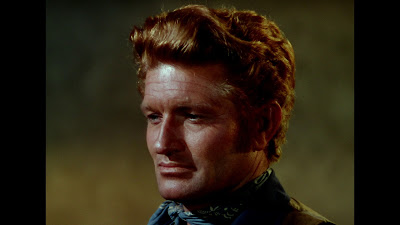Indeed, the structure of Rancho Notorious, now released in a staggering new three strip restoration from Warner Archive to revive the glorious new year, salutes every great director who’s taken advantage of the pointed montage as a full-blooded caesura in the narrative to bring it to a momentous dramatic halt.
So any one of these faces might be a rapist and killer, or none of them, despite the privilege of us as audience who witnessed the original crime. Which face is less “human” than the other, which if any is “not guilty”, but of what? Cinema is never purer than this.
 |
| Marlene Dietrich |
Arthur Kennedy’s consuming need for revenge at any expense will of course lead to a confrontation in which the remaining woman in the narrative takes the hit for his anger. Just as Jocelyn Brando and Gloria Graham take a hit for Glenn Ford in The Big Heat. And Joan Bennett takes a hit for Walter Pidgeon, and so on in Lang.
The sheer classicism of the sacrificial female is beyond biblical in Lang’s world and perhaps it’s that sheer outrageousness that now compels us to understand more fully the destructive futility of leading man after leading man in a world no longer making sense. Only the sheer supreme mythologies of the Indian temple, or the need for balance in a contemporary 1928 world gone mad like my favorite Lang, Spione (Spies) can save us.
Rancho Notorious, like Moonfleet three years later, is another of Lang’s morality tales dressed in period costume with a mixture of sublimely photographed exteriors and even more studio and backdrop artifice shots (like the one I’ve printed above in deference to Ms Joyce Carol Oates’ dislike of Hitchcock’s similar tendency to such cinematic primitivism.) I think with Rancho Lang begins a final period in which he returns to the past for context, either as legend like the West and its codes of violence, or the child’s nightmare, missing father tale of Moonfleet with its tireless search through caves, tunnels and the underworld to reconcile both the lost father and the glittering spoils of the pirate overworld.
Ultimately Lang will return sublimely in color and with Debra Paget to his own mythology with the completely wonderful Von Harbou written Indian Tomb/Eschnapur Tiger pictures which play in episodic style like a Feuillade serial, but one originally written by his then spouse, and directed by another, only to be finally realized by Lang himself, one of the first colony of auteurs on earth fifty years earlier. Lang has ridden full circle and just a few years later Godard imagines and directs him as himself directing the Odyssey in Le Mepris in which he addresses us for eternity through Raoul Coutard's camera.
Rancho Notorious, with its many alternating styles, high montage mode with unexpected tracking shots and its tight clipped narrative, and meditation on the obsession of a wounded man who's lost his future is the beginning of Lang’s very last act.
These are the last two shots from Rancho, bridged with one of Lang's very rare cross dissolve opticals.
From legend to camera to "reality".
Not something recognized by the distinguished Ms Oates.
This new disc from Warner Archive is a tribute to that great outfit who after a year in hiatus is mercifully back on the boards, with a commitment to five titles of restored deep archive cinema a month. Long may the Archive, and oneself live.










No comments:
Post a Comment
Note: only a member of this blog may post a comment.